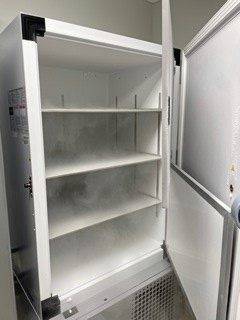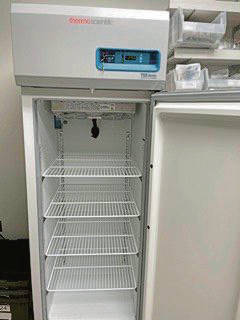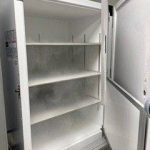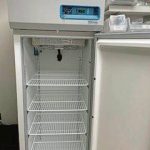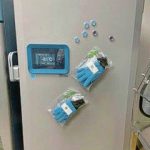Preparing for the covid-19 vaccine is like no other immunization, said Dr. Brian Parker, chief quality learning officer at Allegheny Health Network.
In recent weeks, the network has acquired several massive ultra-cold freezers in expectation of the Pfizer vaccine, which requires an environment of minus 70 degrees below Celsius — colder than Antarctica.
“This is completely new,” Parker said.
Hospitals around the region and country are readying their facilities and making distribution plans for the long-awaited, potentially pandemic-ending vaccines.
Pfizer’s vaccine was shown to be 95% effective during clinical trials, and could receive emergency use authorization from the U.S. Food and Drug Administration on Thursday. Moderna’s vaccine, more than 94% effective, also has applied for the authorization.
The level of scheduling, planning and coordination that’s gone into the covid-19 vaccine distribution is unlike anything hospital administrators have had to deal with, officials said. Every decision is based on recommendations from the state and from the Centers for Disease Control and Prevention, which has devised a phased approach to distributing doses.
Health care workers and those in long-term care facilities will come first.
Keeping the vaccine frigid
Parker said almost no other routine immunizations require such intense cold for storage — these are temperatures usually associated with research laboratories where biological materials are stored for medical research.
AHN purchased freezers for every network hospital, ranging in size from about 19 to 29 cubic feet, all for a total of around $253,000. Parker said the network wanted to ensure extra space, in case nursing homes, clinics and other facilities with prioritization from the CDC won’t be able to buy their own.
It’s an investment each system in the region has had to make: Dr. Graham Snyder, UPMC’s medical director of infection prevention and hospital epidemiology, said the system has procured additional cold storage for the Pfizer vaccine, and it’s ready to maintain the “cold chain” from storage to administration.
When asked how many new freezers the system acquired, leaders answered, “enough.”
“As we speak, hospitals around our network are preparing to receive thousands of doses of the Pfizer covid-19 vaccine,” Snyder announced at a virtual news conference Tuesday. “We also expect the Moderna vaccine to be arriving soon at our skilled nursing facilities.”
Excela Health, meanwhile, plans to use dry ice to store the doses in lieu of additional freezers.
“We have one freezer that can maintain the required temperatures,” said Chief Medical Officer Dr. Carol Fox. “However, we anticipate the vaccines to come from the state in special containers with dry ice that will maintain the appropriate temperature for five days. We will be able to recharge those containers with dry ice if need be.”
Distribution plans
Along with the physical preparations, distribution plans require a lot more effort than the typical flu vaccine, Parker said. Each AHN hospital has its own project manager that’s planning exactly where vaccinations will occur for employees, he said, and they are coordinating which units will receive the first doses. The state has reporting requirements — the hospitals will need to record each vaccination given and update the state every 24 hours so distribution, as well as any potential side effects, can be tracked.
“It’s being done in a very organized, methodical fashion,” he said. “We’re running those priority lists of those individuals that take care of those covid patients first — physicians, nurses, ancillary staff, all of that — and then once we get through those individuals with the doses, we’ll start working on the other hospital units in the in-patient setting.”
Not all workers can be vaccinated at once, Parker said, because they potentially could develop short-term symptoms as a side effect. This came up during UPMC’s news conference, too: Snyder said it is completely expected and routine.
“We’ve heard that some participants experience a fever, fatigue and or arm pain after vaccination that may be intense enough to require a day or two off of work,” he said. “This is a normal and healthy response to some vaccines, and we will plan our administration schedule accordingly.”
Snyder said a team of viral infection and vaccine experts at UPMC are independently reviewing data related to vaccine effectiveness, “to tell us if the vaccines are safe and effective to use in our communities.”
“Our team has been hard at work — everything from our supply chains, to our clinical experts to our employee health teams — to prepare to give the vaccine as soon as those criteria are met,” he said.
The same plans are underway at Excela Health.
“We are in the process of developing an immunization schedule for health care workers that will ensure that we are distributing the vaccines across the workforce in a manner that will take into account the potential for individuals to experience side effects that might mimic covid, and therefore may result in missed work,” Fox said.
The process of staggering immunizations for thousands of employees is a time-consuming, complicated process.
Flu vaccinations typically occur over several months, for example, and the process for ordering and acquiring doses is much more routine. The distribution and manufacturing is already in place.
“It’s a quick process like never we’ve had to do before,” Parker said. “But it’s work that a lot of people are absolutely rallying around to do, because it’s a positive coming out of all the hard work and things that have happened over the last nine-plus months.”


